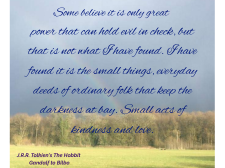Kindness Day UK on November 13th is a nationally recognised day for the celebration of kindness in society and day to day life. Individual acts of kindness are encouraged on this day annually.
Kindness isn’t just about being nice—it’s a powerful force for personal and social transformation.
Kindness UK has some suggestions for acts of kindness in different categories; environmental, community & nature.
https://kindnessuk.com/acts_of_kindness.php
As a counsellor working with bereavement and trauma, I see the impact that lack of kindness has on how we cope with distressing events. Sir Nicholas Young, CEO of the British Red Cross says
“It is kindness that helps people cope with a crisis”
I see the difference in people who may have gone through the same event, such as, perhaps, a difficult birth, but have had very different experiences of how medical staff treated them. The ones who weren’t treated with kindness are more likely to experience what happened as traumatic and maybe even go on to develop PTSD. So, offering kindness in difficult circumstances and times is protective for our mental health. Researchers at Cambridge University found that witnessing a kind act encouraged the person observing this to then go on to be kinder too.[1]
Of course, if staff are not treated with kindness by employers or valued by society then it is much harder for them to be kind to others at work themselves. By creating a kindness culture in the workplace, stress is reduced, better relationships are fostered, health is increased and ultimately engagement is encouraged. Even safety can be improved such as in the airline industry with its ’Just Culture’ which balances accountability with fairness and learning from mistakes, creating a transparent, safe environment where employees are confident they will be treated fairly.
Some professions including counselling and therapy have consultative supervision or reflective practice that supports them in their work and offers space to reflect on difficult situations. This support helps us maintain resilience and creates a safe space for learning. For professions that don’t have this (I’m amazed that all health professionals still don’t have access to this), it might be worth seeking out a therapist to give you this space to support you in your work.
A kind and respectful society, whether in the community or in the office, encourages human beings to collectively thrive.
How else might kindness to others benefit us? Recent research [2] compared acts of self-kindness to kindness towards others. It showed that the self-kindness group felt less depressed with kind self care but didn’t feel any difference in anxiety or loneliness. However, the group doing acts of kindness for others experienced significant decreases in depression, anxiety, and loneliness before, during and after the act of kindness. While the self-kindness group reported experiencing more positive feelings during their acts of kindness, the other-kindness group felt less lonely.
What are the health benefits of kindness? A 2022 study[3] showed that although chronic stress can take a serious toll on our health, kindness may be a natural antidote. Performing acts of kindness can lower cortisol levels, reduce stress and even help to lower blood pressure. Acts of generosity may also be linked to lower inflammation levels and improved immune function.
What about self-kindness and compassion? Self-compassion is a strength that builds self-awareness and resilience and fosters self-acceptance and wellbeing[4] We often speak more harshly to ourselves, with the voice of an inner critic, than we would to a friend or loved one. With self-compassion, we notice what we are feeling and how we are speaking to ourselves and can ask, would I say that to a friend? If we grew up in a family that nurtured this skill it may come easier, but it is a skill that can be learnt and practiced for anyone. If you struggle with doing this, it can help to work with a therapist on building this skill.
Balancing kindness to self and others involves practicing self-compassion to meet your own needs while setting healthy boundaries to avoid burnout and protect your well-being. It means treating yourself with the same understanding and warmth you would a friend, especially during difficult times, and then extending that same empathy outwards to others.
[1] Schnall S, Roper J, Fessler D M T “Elevation Leads to Altruistic Behavior” Psychological Science 21 (2010)
[2] Naclerio, M., Lazar, L., Hornstein, E. A., & Eisenberger, N. I. (2025). Exploring the effects of prosocial and self-kindness interventions on mental health outcomes. Emotion. Advance online publication. https://doi.org/10.1037/emo0001577
[3] Fryburg DA. Kindness as a Stress Reduction-Health Promotion Intervention: A Review of the Psychobiology of Caring. Am J Lifestyle Med. 2021 Jan 29;16(1):89-100. doi: 10.1177/1559827620988268. PMID: 35185431; PMCID: PMC8848115.
[4] Neff, K. D. (2023). 'Self-compassion: Theory, method, research, and intervention'. Annual Review of Psychology, 74(74), 193-218. https://10.1146/annurev-psych-032420-031047
